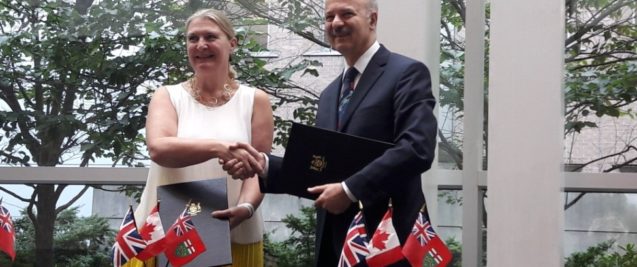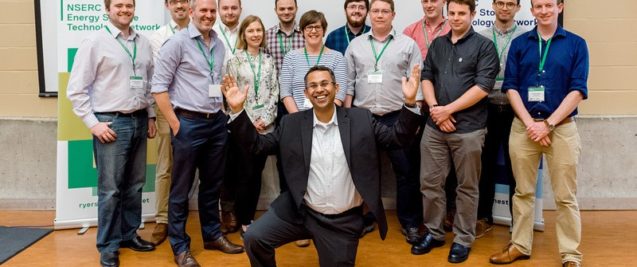2nd November 2017
Tokyo, Japan
Science is a global enterprise. The best researchers in the UK want to work with the best researchers across the globe. Japan is a very strong research nation – it is a country of world leading researchers and technologies that invests over 3.5% of GDP in R&D and has had more Nobel Prize winners since […]
Read more on Research without Barriers – a step-change in UK-Japan collaboration | Reply (1)
5th October 2017
Toronto, Canada

The United Kingdom and the Canadian province of Ontario are both leading global centres of science and innovation and are investing in many of the same transformative sectors. To provide a platform that will help to further the ties between the two jurisdictions, a Memorandum of Understanding (MOU) on Transformative Technologies was signed in Toronto […]
Read more on Transformative Technologies: UK-Ontario Look to the Future | Reply (1)
28th September 2017
Beijing, China

Fibre optic cables with acoustic sensing that can be laid alongside railways or oil and gas pipelines to detect faults or security threats; lasers that can detect different types of gases and pollutants with very high precision; sensors that measure water loss across the skin barrier that can be used in cosmetics or diagnostics; sensors […]
Read more on Sensors for just about everything | Reply
28th August 2017
Beijing, China

I keep saying it, but I can’t believe how fast the past four years has gone. It’s been a non-stop whirlwind but it’s been a great pleasure to lead the UK’s science and innovation relationship with China during these exciting times. When I started the Newton Fund didn’t exist and now it stands at £360m […]
Read more on Goodbye to China! (for now) | Reply
9th August 2017
Toronto, Canada

Renewable energy has been around for decades, yet solar and wind power hasn’t really taken off as main energy sources. This is in part because when it isn’t sunny or windy, we haven’t found a great way to store the energy for future use. In order to keep up with emerging clean forms of energy […]
Read more on Collaboration key to future of energy storage | Reply
3rd July 2017
Guangzhou, China
Guangdong Province is China’s largest provincial economy and the principal driver of the national economy over the last 30 years. Under China’s innovation-driven development strategy, Guangdong is positioned as China’s Innovation Centre for Science and Technology Industry, with special focus on industrial development and technology transfer. Companies in Guangdong employ more R&D personnel than any […]
Read more on Working together to tackle urban challenges: MoU signed between Innovate UK and Guangdong | Reply
23rd June 2017
Osaka, Japan
Situated in the South West of Japan, Fukuoka is Japan’s fifth largest city and the fastest growing – from 2010 to 2015 it grew 5%, significantly faster than any other major city in Japan. With a population of 5.1m (larger than Ireland), it also has the highest ratio of young residents (c.20% aged 15-29). Geographically […]
Read more on Innovation out west: cutting-edge regenerative medicine research, entrepreneurial support and business-academia collaboration in Fukuoka | Reply (1)
19th June 2017
Tokyo
Last week, I had the privilege to attend the annual Japan Academy Prize. The Prize recognize outstanding achievements in Japanese research excellence and previous winners include Nobel Laureates such as Professor Isamu Akasaki who led development of blue LEDs. This year’s winners included a pioneer of pediatric cardiac surgery, researchers who identified the genetic pathways behind […]
Read more on Women in STEM: what’s changing in Japan? | Reply (1)
16th February 2017
Montreal, Canada

The answer likely isn’t obvious, but both were either discovered or invented by a Canadian researcher. The former relates to the 2015 Noble Prize in Physics awarded to Prof. Arthur MacDonald, whereas the latter is the game invented in 1891 by Dr. James Naismith.
Read more on From Blackberries to basketball: why we work with Canada in science | Reply
16th January 2017
Toronto, Canada

Imagine being able to hop into a vehicle, tell it where you want to go, then be able to pull out your laptop and watch some TV, or get some work done on the way to your destination!
Read more on Leaders in the connected lane: UK and Canada look to make cars safer and smarter | Reply (3)





